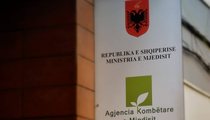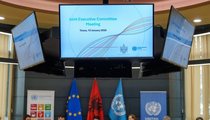"Redefining Life on Earth": Three-quarters of the world's land is drying up forever!

More than three-quarters of the world's land became permanently drier in recent decades, according to a landmark report by the UN Convention to Combat Desertification (UNCCD). The UNCCD says 77.6 percent of Earth's land experienced drier conditions over the three decades to 2020 compared to the previous 30-year period. At the same time, drylands expanded to an area nearly a third larger than India and now cover more than 40 percent of all land on Earth (excluding Antarctica).
The UNCCD report was released at a UN summit in Riyadh, Saudi Arabia, on combating desertification, when once-fertile lands turn into desert thanks to warmer temperatures from human-caused climate change, water scarcity and deforestation. "The drier climates now affecting vast lands around the globe will not return to what they were," warns Ibrahim Thiaw, head of the UNCCD, which is facilitating the talks in Riyadh. "This change is redefining life on Earth."
This year was the hottest on record, and if global warming trends continue, nearly five billion people - including in much of Europe, parts of the western US, Brazil, East Asia and Central Africa - will be affected by drought. until the end of the year. century, explains the UNCCD report.
UNCCD chief scientist Barron Orr warns that drier land could lead to "potentially catastrophic impacts on access to water that could push people and nature closer to tipping points," where people are no longer in able to reverse the harmful effects of climate change.
As the atmosphere heats up from the effects of burning coal, oil and gas, it leads to more evaporation on land. This makes water less available for people, plants and animals, making survival more difficult. Agriculture is particularly at risk, with drier land being less productive and harming both yields and the availability of feed for livestock, leading to food insecurity for communities around the world.
Aridity also leads to more migration because erratic rainfall, degrading soil and frequent water shortages make it more difficult for regions or nations to develop economically, the UNCCD report says. The trend is particularly evident in some of the driest areas of the world, such as southern Europe, the Middle East and North Africa, and southern Asia.
At COP16, negotiators in Riyadh are mainly discussing how the world can better respond to more frequent and damaging droughts. Jes Weigelt, of the European climate institute TMG, says the drought is a sticking point because countries cannot agree on whether rich nations should raise funds for drought responses around the world.
Any money pledged would go towards better forecasting and monitoring systems, as well as the creation of reservoirs and other structures that can provide access to water even during extended periods of drought. The big controversial issue is do we do this [drought response] through a binding UN-level protocol or are there other options we should explore? A binding protocol would mean that, among other obligations, developed countries could be required to provide funds.
UNCCD chief Thiaw says the summit's host country, Saudi Arabia, by pledging $2.15 billion (€2.4 billion) from various countries and international banks for drought resilience, has set the right tone for the talks. And the Middle East-based Arab Group of 10 development banks pledged $10 billion (€9.49 billion) by 2030 to tackle land degradation, desertification and drought.
The funds are expected to support 80 of the most vulnerable countries to prepare for worsening drought conditions. But the UN estimates that between 2007 and 2017, droughts cost $125 billion (€118.7 billion) worldwide. "As hosts, our main objective is to help facilitate the critical discussions that are taking place," says Osama Faqeeha, Saudi Arabia's deputy environment minister and an adviser to the presidency of the talks. "These crises know no borders."
While drought can be damaging, Thiaw writes in the UNCCD report, recovery is possible. But he calls soil drying "an inexorable threat that requires sustained adaptation measures."
Longer-term solutions, such as curbing climate change, are not much of a talking point at the Riyadh summit. Host Saudi Arabia has long been criticized for stalling progress on curbing fossil fuel emissions at other negotiations, such as COP29. The country is financially dependent on fossil fuels and is one of the oil states expected to lose half of its income in an exit.
The UNCCD report recommends that countries improve their land use practices and be more efficient in their water use. This includes scaling up measures such as growing crops that need less water and more efficient irrigation methods, such as drip irrigation, on a much larger scale. It also suggests better monitoring so communities can plan ahead, and large-scale reforestation projects to protect the soil and its moisture.

"White gold", essential for the successful trade agreement of Europe with South America!
The strategic importance of lithium likely played a big role in the European Union's successful deal with Brazil, Argentina and three other South American......

Albanians open the "bag" for holidays - On average, an Albanian has spent 380 euros on holidays abroad
Encouraged more and more by low-cost flights and by the devaluation of the euro, Albanians who vacationed abroad during the summer season spent approximately......

China's imports mark the biggest drop in 14 months!
China's exports and imports missed expectations in November, data from the country's customs authority showed on Tuesday, fueling concerns about the health......

China continues lithium production despite glut - Aims to maintain market dominance in electric car sector
Many lithium mines, run by Chinese companies, are continuing to produce lithium for electric vehicle batteries, even though prices are low enough to cause......

Lot III of the road axis Elbasan-Qafë Thane - Balluku: 56% of the works on this site have been completed
The Deputy Prime Minister, at the same time Minister of Infrastructure and Energy, Belinda Balluku, has inspected the works on the 3rd lot of the......

The railway will be divided into two companies - The draft law receives agreement in the parliamentary committee amid debates
The division of the "Albanian Railways" company into 2 companies was accompanied by strong debates during the discussion of the draft law in the......

"Tirana-Durrës train, trips in 2026" - Muçaj: Next year, the procedure for the Durrës-Rrogozhinë-Pogradec railway
The Tirana - Durrës railway will be operational at the beginning of 2026. From the Commission of Production Activities, vice. the Minister of Infrastructure......

Albania, one more reform in the National Agenda - 31 will be implemented in total. Alignment of visa policy with EU standards is added
The draft national reform agenda, which was sent to the European Commission for approval in July this year and was approved in November, contained a total of......


















